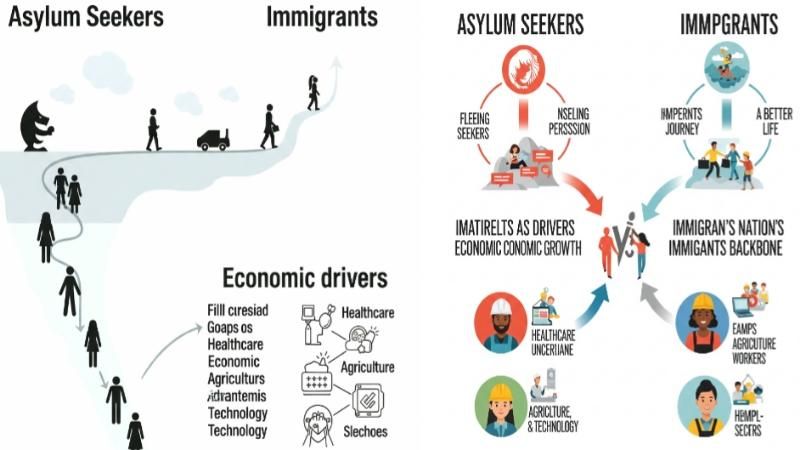In conversations about migration, the terms "asylum seeker" and "immigrant" are frequently, and often inaccurately, used interchangeably. This blurring of lines contributes to widespread misconceptions, sometimes leading to a generalized negative perception among the public, including some in Britain, towards all newcomers. It is imperative to clarify that while both groups seek new lives in a different country, their legal standings, motivations, and pathways to residency are fundamentally distinct, Daily Dazzling Dawn understands.
An asylum seeker is someone who has fled their home country, seeking international protection because they genuinely fear persecution, war, or severe harm if they were to remain. Their plea for safety is rooted in international law, specifically the 1951 Refugee Convention, which obligates signatory states to protect individuals defined as refugees. Their journey is often one of desperation, with survival being the primary driver. Upon arrival, they formally apply for asylum and remain in a vulnerable legal state until their claim is assessed, a process that can be protracted and often restricts their right to work.
In stark contrast, a regular immigrant makes a deliberate, often pre-planned choice to move to another country. Their motivations are typically rooted in economic opportunity, educational advancement, family reunification, or a desire for a different lifestyle. They navigate established legal channels, applying for specific visas that dictate their rights and responsibilities from the outset. Unlike asylum seekers, regular immigrants usually have the right to work and access public services once their visas are granted. Their move is a voluntary transition, rather than a desperate flight from danger.
The fundamental difference lies in compulsion versus choice: asylum seekers flee out of necessity, fearing for their lives or freedom, while immigrants choose to relocate for betterment. This distinction carries significant implications for their legal status, the support they require, and their integration into new societies.
Immigrants: The Unsung Drivers of National Prosperity
Beyond the crucial legal distinctions, it's vital to recognize the profound and often indispensable contributions of immigrant communities to the economic and social fabric of nations like Britain and the USA. Far from being a drain on resources, immigrants are often the engines of growth, filling critical labour shortages and fueling innovation.
Consider these sectors, which are profoundly reliant on immigrant labour:
Healthcare: Across both the UK's National Health Service and the US healthcare system, immigrants form a disproportionately large and absolutely vital part of the workforce. They are doctors, nurses, care assistants, and support staff on the front lines, ensuring the health and well-being of the entire population, a reality starkly highlighted during the recent global pandemic.
Agriculture: Immigrant workers are the very backbone of the agricultural industry, performing the arduous and essential labour of planting, harvesting, and processing food. Without their dedicated efforts, food production would suffer significantly, leading to higher prices and potential shortages for all.
Hospitality and Food Services: From the bustling kitchens of restaurants to the welcoming lobbies of hotels, immigrants are indispensable to the vibrant hospitality sector. They serve as chefs, waiters, housekeepers, and a multitude of other roles that keep this vital service industry thriving.
Construction: Immigrant labourers are heavily represented in construction, undertaking the physically demanding jobs that build and maintain our vital infrastructure, homes, and commercial buildings.
Science, Technology, Engineering, and Mathematics (STEM): Highly skilled immigrants play a crucial role in driving innovation. They contribute to cutting-edge research, develop new technologies, and fill critical skill gaps, propelling economic growth and maintaining global competitiveness.
Beyond these specific industries, immigrants contribute significantly through taxation, consumer spending, and entrepreneurship. They often exhibit higher rates of business creation, launching new ventures that generate jobs and foster economic dynamism. Their diverse cultures also enrich societies, bringing fresh perspectives, traditions, and culinary delights that enhance the social landscape for everyone.
Understanding the clear differences between asylum seekers and immigrants is not merely an academic exercise; it's essential for fostering informed public discourse and building more inclusive and prosperous societies. Recognizing the immense value that immigrant communities, in particular, bring to their adopted countries is key to dispelling myths and celebrating the multifaceted contributions of all who choose to make a new home.








.svg)



